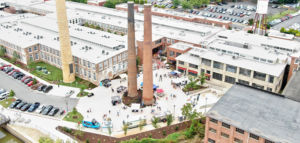WASHINGTON, D.C., September 1, 2021 – The National Trust Community Investment Corporation (NTCIC) is proud to announce the successful financial closing of the Mill House, the final phase of the historic Revolution Mill Complex revitalization in Greensboro, North Carolina. The $37.7 million revitalization effort, led by Self-Help Ventures, will create affordable commercial spaces for growing local businesses, a business incubation program, and mixed-income housing options for the neighborhood. NTCIC provided $5 million in New Markets Tax Credit (NMTC) allocation and an equity investment in the $6.1 million in federal Historic Tax Credits (HTC) generated by the preservation efforts.
A Well Spun History
Built in 3 phases between 1900 and 1915 in Greensboro, North Carolina, the Revolution Cotton Mills is reputed to be the first flannel mill in the South, at a time when flannel was an increasingly popular fabric. By the 1930s, Revolution Cotton Mills had become the largest exclusive flannel mill globally, growing to over 1 million square feet and producing over 50 million yards annually.
It remained in operation for over 80 years before shutting down in 1982. In 2012, Self-Help Ventures bought the mill and embarked on the first phase of redevelopment for the complex. The main campus was complete in 2019, and the Mill House project, located in the mill’s former textile storage facility, represents the final piece of the Revolution Mill development.

The Mill House (bottom right) is the final phase of the Revolution Mill redevelopment efforts.
A New Future Looms
Projected for completion in 2022, the Mill House includes 33 mixed-income units, more than 57,000 square feet of commercial space, and nearly 10,000 square feet of coworking space managed by Self-Help.
“The Mill House redevelopment is the final piece for the vibrant Revolution Mill campus,” said Kathleen Galvan, NTCIC’s Senior Project Manager, who oversaw the financial closing. “I was able to tour the campus in person and witness the impact that the first phase made for the community. The project will bring even more opportunities for small businesses to thrive and continue the sense of community and entrepreneurship that is brewing on the campus.”
The first floor will be a combination of retail and restaurant space, including a wellness center, a café, and a locally-owned restaurant. The second floor will be primarily used as a coworking space managed by Self-Help and will offer flexible lease terms and come with furniture, fiber internet, and other services like printing/copying, mail service, and access to shared meeting space. The upper floors will include one- and two-bedroom rental units, 20% of which will be income-restricted.
Impacts of Historic Preservation
The Mill House has been vacant and underutilized for nearly 40 years, deteriorating considerably during that time. The revitalization efforts will create an estimated 200 construction jobs, which will pay above living wage with full-benefit packages.
Once complete, the project will support 225 permanent jobs through new and existing businesses. The business incubator managed by Self-Help will support 25 small businesses annually, and five additional office spaces in the building will be marketed at below-market rents for local, MBE/WBE businesses and nonprofit organizations.
The local restaurant and retail tenants will be provided with a flexible rental structure to help them succeed and expand into the area market. It is anticipated that over half of the restaurant and retail businesses will be minority-owned.
Contact us today to discuss your next historic development!